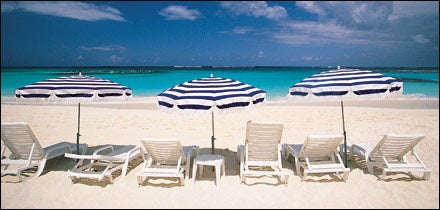IN THE PAST six months, I haven’t ventured more than a few hours from my house. For a supposed travel writer and naturally itchy vagabond, it’s rare to sit still so long. I haven’t lost my wanderlustfar from itbut like many traveling Americans, economic worries have kept me nested in my neat little suburban bubble, clutching what’s left of my 401(k) and hoarding frequent-flier miles in case I need to barter them for percussion grenades and shoulder pads when the world turns all Mad Max.
I have no sway over foreclosures or our plummeting GDP. But looking back to past hard times, I’ve decided we wary travelers have been getting it all wrong. Previous economic hiccups have turned out to be perfect for travel. Spending a few bucks, rather than stuffing cash into a mattress, even helps get the economy back on track. When the market’s down, experience tells us, it’s time to get going.
Take, for example, the year following the September 11 attacks. Airlines, tour operators, and the entire travel industry saw bookings dry up. It was fearjustified fear, for sure, but the same primary emotion that’s driving our choice to stay home now. Back then, there was a recovery and a return to normalcy. And it turned out to be a wonderful and cheap time to explore the world. If everything does go to hell this time, you’ll never regret that last trip to Tibet before the return of the Stone Age.
There are practical advantages to heading out now, too. First, there are fewer crowds, meaning independent travelers can get into places like four-star hotels in India or safari lodges in Africa that are usually booked a year in advance. You can be spontaneous in areas like Europe, where, typically, not having a reservation means grappling with a stoned Austrian for the last berth in a hostel.
Even better, the downturn is stoking fire-sale prices. In the past few weeks, my inbox has been flooded by desperate tour operators and visitors’ bureaus making their best sales pitches. “Bailout Specials” abound. Iceland, one of the most expensive countries in the worldand nearly bankrupted by the economic falloutissued a press release titled “Our Loss Is Your Gain,” which touted the U.S. dollar’s doubling in value against their krona. Some operators are suspending cancellation fees. And with gas prices finally dropping, airfares may begin to shrink as well. This could be the cheapest time ever for your dream trip.
For the most part, tour operators know that things may slow down, but they’ve seen it before. “We’ve been through so many thingsguerrilla uprisings, volcanoes blowing upwe know how to keep the business operating through hard times,” says Barbara Banks, director of new-trip development at Wilderness Travel, which has run adventure trips for 30 years. In fact, fewer bookings often means travelers can mingle more closely with local cultures. “After 9/11, some treks in Nepal had two or three people led by a local veteran Sherpa guide.”
John Sugnet, of Geographic Expeditions, also remembers the unexpected benefits of the previous slowdown. “After 9/11, and during the brief SARS pandemic, there was definitely more elbow room,” he says. “You’d see fewer people on the trail. You could really take in the tonic of nature.”
At Mountain Travel Sobek, spokeswoman Kim Beck doesn’t think the economy will stop people from booking. “Taking an adventure-travel trip is a risk of sorts anyway,” she says. “People with wanderlust in their blood simply can’t not do it.”
But let’s say the worst happens. You’re out of a job. You’ve traveled the country like Neal Cassady, but there’s no work to be found. It’s time to take a lesson from the casualties of the late-nineties dot-com meltdown. Many of the laid-off took a gap year while the economy healed. If you find a pink slip on your desk, go surfing in Bali. Wash dishes and ski in the Alps. Hike the Pacific Crest Trail. A seasoned traveler learns quickly that the limiting factor in adventuring is not money but time. You may not have another six-month or yearlong hiatus until you’re hip-breaking age.
I’ve realized that the thing keeping me in a holding pattern has been uncertainty. But the best trips I’ve taken have always had a healthy dose of the unknown. If you’re like me, travel is not simply an occasional luxury; it’s a necessity to keep your life balanced. So I say screw the Dow, the S&P, and the Federal Reserve. If my broker needs me, he can reach me on my sat phone.


